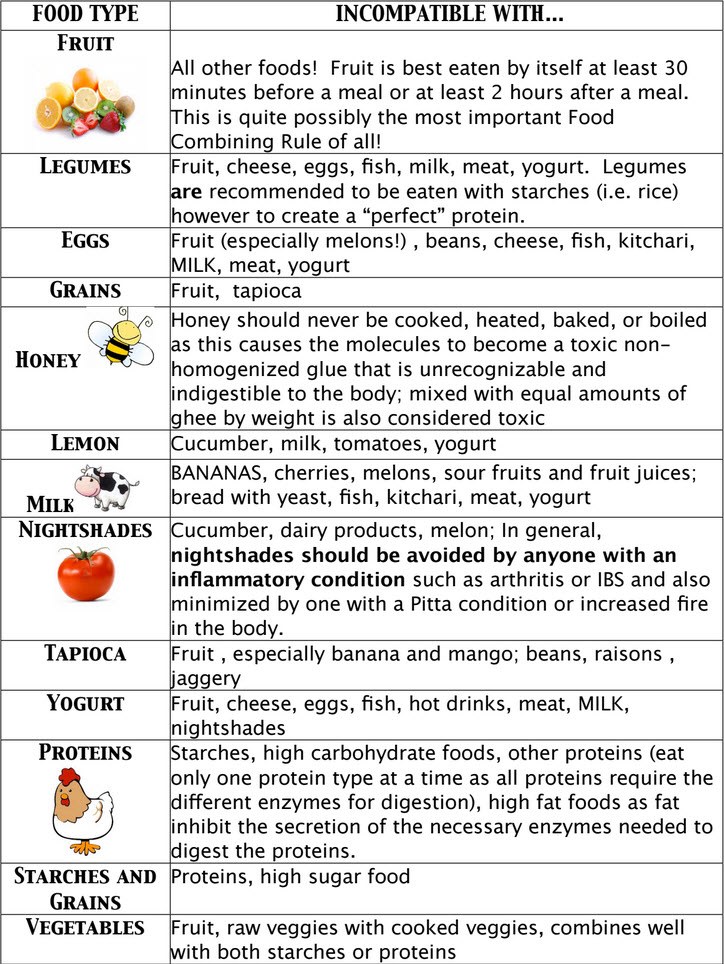 Although Ayurveda can get a bit complicated at times, I always feel that it is best to keep things simple and stick to the basics. If you avoid getting lost in all of the information out there, you will discover that finding a healthy Ayurvedic diet doesn’t have to be overly tedious with endless lists of complex food rules and food charts. Although these can be helpful at times, they can also lead to excessive stress around food, over-analyzation, and just utter confusion. In fact, the stress and frustration created by trying to follow anything to a tee, can be as detrimental as some poor eating habits. These common dietary turmoils tend to produce undue worry and fear around eating as well.
Although Ayurveda can get a bit complicated at times, I always feel that it is best to keep things simple and stick to the basics. If you avoid getting lost in all of the information out there, you will discover that finding a healthy Ayurvedic diet doesn’t have to be overly tedious with endless lists of complex food rules and food charts. Although these can be helpful at times, they can also lead to excessive stress around food, over-analyzation, and just utter confusion. In fact, the stress and frustration created by trying to follow anything to a tee, can be as detrimental as some poor eating habits. These common dietary turmoils tend to produce undue worry and fear around eating as well.
To keep things simple, I recommend for you to focus on a few of the most important Ayurvedic dietary guidelines to begin with. No matter which dosha type you may be, these basic rules can apply to every-body of all ages and all levels of health. Although it is important to not be too strict when following guidelines, it is also important to not be too relaxed about it either. Just like everything in life, you must find a healthy balance, knowing when your body need more discipline and when it may be alright to play around a bit. As a general rule, I always say that the stronger and more chronic the imbalance, the more diligent you should be during the healing process.
So if you are ready to start a healthy, balanced Ayurvedic diet, here are some of the main guidelines to keep in mind. Once again, these rules can apply universally, no matter your dosha type. However, as you will see in number four, it will be important to know which dosha type(s) you may be and which dosha(s) is/are currently imbalanced. This will help you figure out some more specific guidelines to follow.
Take our Discover your Dosha Quiz now!
Basic Guidelines for a Healthy Ayurvedic Diet
1. Eat On a Healthy, Consistent Schedule
Whether you like it or not, your body craves and strives off of routine. This means that in order to find balance in your digestion, it is extremely vital that you are eating three meals daily, at proper times each day. Eating at routine times will provide your body with the regularity to know when food is coming and therefore begin its necessary internal preparation before the food even comes. It also allows you to stabilize your energy, blood sugar level, and appetite which will allow you to make better decisions on your meal choices. Have you ever missed a meal which led you to grab whatever foods were available at hand? This often leads to poor food choices, grazing, and overeating.
Here is a simple chart for you to keep in mind for healthy eating times. I also added in some general key points to remember in regards to each meal.

*The dinner can be a bit later in the summer months if Kapha is not imbalanced.
Healthy Breakfast Recipes Ideas:
- Golden Energy Buckwheat Breakfast
- Sweet Potato Millet Porridge
- Simply Spiced Quinoa Porridge
- Ojas Increasing Oatmeal
- Energizing Chia and Sweet Potato Smoothie
- Svastha Super Green Smoothie
2. Do Not Skip Meals
Continuing on from number one, skipping meals should always be avoided. This unhealthy habit often leads to an increase in Vata, a drop in blood sugar levels, a decrease in energy levels, a foggy mind, a sluggish digestion and metabolism, snacking, grazing, poor food choices, and eventually overeating.
If your current schedule is not allowing you to eat breakfast or take a lunch, I would make it a high priority to change your schedule. This is extremely important for your health, both body and mind. Not to mention your work performance and cognition levels will diminish when you do not have the proper fuel. Alternatively, your productiveness and efficiency will undoubtably increase by eating a healthy meal, at its proper time.
3. Avoid Improper Food Combinations
This is another crucial recommendation when it comes to your digestive health. Often individuals come to me saying, “I do not understand. I eat healthy foods, yet I am still suffering from many digestive issues.”. This is because it is not always what you are eating, but how you are eating it. One food may be healthy and easy to digest on its own, but when combined with certain foods may become “poison” to the body causing fermentation, gas, bloating, hyperacidity, and toxins. Therefore it is imperative to look at your eating habits and make sure to avoid eating improper food combinations as much as possible.
Here are the top three food combinations to watch out for:
- Always eat fruit by itself. Eating fruit with ANYTHING else will lead to indigestion and fermentation in your gut. Therefore fruit should only be eaten on its own. You can eat fruit either 30 minutes prior to a meal, or at least 2 hours after a meal. That means fruit is not a healthy dessert option, nor is it suggested to be eaten as a side dish or on top of your yogurt or cereal. I know this is hard to hear, but you will feel better for it in the end!
- Only eat one animal protein per meal. Different proteins do not digest properly when mixed together. Animal proteins are already heavy and hard to digest, so adding the improper food combining will really lead to many digestive issues. Make sure that each meal only contains one protein type. This means to eat cheese separate from meat, eggs without bacon or sausage, and definitely no bacon-cheeseburgers.
- Do not mix starches with animal proteins. Since these two food types need completely different pH environments to digest properly, they are considered incompatible and should be eaten separately. This seems unheard of in the West with our steak and potato, rice and chicken, burger and bun mentality; so inevitably this will take a bit of getting used to for most individuals. When eating meat, less starchy grains such as millet or quinoa can be a good compromise compared to a more starchy side such as rice or pasta.

Click here for a printable PDF copy of the Improper Food Combining Chart.
4. Avoid Eating On the Go
When it comes to healthy eating, it is not always what you eat, but how you eat. Ayurveda puts a strong emphasis on the fact that each and every meal (or snack) should be eaten sitting down, with great awareness. This means that you should not only avoid eating on the go (such as in the car or while walking), but even at your desk while working. In fact all electronics and distractions should be avoided while eating, including talking on the phone, playing on the computer, watching television, attending a meeting, or while in heavy conversation. Instead, take the time to find a quiet space to sit down, and give focus on chewing each bite and taking in all of the tastes that go with it. This will not only be useful for allowing your body to focus on digesting the food properly, but it will give you the capacity to avoid mindless eating habits and to become aware when you are truly full (before it is too late).
5. Eat For Your Dosha Type
If you know your dosha type, as well as which dosha is currently out-of-whack, you should make it a high priority to follow their respective basic food guidelines accordingly. For instance, this means that Vata types ideally will avoid cold, raw foods; Pitta types should avoid hot, spicy, and inflammatory foods; and Kapha types should avoid heavy, sticky foods like dairy and gluten. You may be eating perfectly healthy foods; however, they may not be healthy for your individual needs and in turn will cause disruption in your system.
Click Here to Discover Your Dosha Type!
Read more on the main dietary guidelines per dosha:
- Vata Dietary Guidelines
- Pitta Dietary Guidelines
- Kapha Dietary Guidelines
- Vata-Pitta Dietary Guidelines
- Vata-Kapha Dietary Guidelines
- Pitta-Kapha Dietary Guidelines
6. Eat For the Season
No matter what your dosha type may be, it is always important to eat with the season. This can also be helpful if you have multiple doshas that are predominant or more than one dosha imbalanced at any given time.
To eat with the season can have a couple meanings. First, it is always best to eat seasonally fresh (and ideally local) produce. For instance berries are at their peak in the summer months, but may be lacking in both taste and nutrients when you eat them in the wintertime; instead favor stewed apples, pears, and citrus during the fall and winter seasons.
Second, it is also essential to eat warming foods in the cold months and favor cooling foods in the hotter months. For example, in the winter you should favor hot soups with lots of warming spices and well-cooked root vegetables; while in the summer this may be too heavy and heating. For the summer, try adding some cooling foods to your meals such as cilantro, coconut oil, cucumber, bitter greens, lime, and ghee. By eating intelligently with the season you will naturally be helping to keep you, your digestion, and your doshas in balance.
7. Avoid Late Night Eating
Although you probably already heard this many times, it is truly crucial to avoid eating food late at night. The exact time to finish eating may vary slightly, but as a general rule I would recommend to end all food intake by 6pm*. Your body and your metabolism are naturally slowing down each evening, typically around the same time as the sun is setting. Therefore whatever you put in your body at this time will have a much slower transit time when traveling from your stomach to your colon. This is further impeded by your sedentary nature after dinner (generally speaking), which gives you little movement and space for proper digestion. With longer transit times mixed with sleep coming soon, this sets up a stage for any late night foods to simply sit in your gut until morning. This will lead to a groggy awakening, dull morning appetite, sluggish digestion, and eventually toxicity.
*This time may be a bit earlier in the dark winter months, but a bit later for the summer.
8. Avoid Grazing and Excessive Snacking
Although having a small, healthy snack (e.g. a piece of fruit, a cup of yogurt, OR a handful of nuts) in between meals may be recommended for some individuals (generally Pitta and Vata types), grazing or taking in multiple snacks should always be avoided. This is because eating (even small amounts) too frequently will cause your digestive fire (Agni) to be at work continuously throughout the day. This overtaxes your Agni, as well as your pancreas, and leads to sluggish digestion and toxic build-up. On top of this overwork that occurs, often many food combining rules will be broken when grazing, making all of these negative effects even more heightened. So stick to your three meals each day that are filled with lots of fiber and lean protein, which will keep you full and make snacking unnecessary.
9. Take a Digestive Stimulant Before Meals
If you are experiencing any digestive woes, a common Ayurvedic practice is to prep your fire with a stimulating digestive appetizer before each meal. This can be something as simple as ginger tea with honey. Depending on your digestive needs, this can be taken up to three times daily, 30 minutes (or less) before eating.
No matter what you chose, these helpful digestive aids will spark your digestion and release vital enzymes. This in turn will help to ward away issues such as gas, bloating, hyperacidity, sluggish metabolism, dull appetite, and sleepiness after food. Remember that all of these symptoms are pointing to a weak or imbalanced digestive fire and according to Ayurveda… an impaired digestion is the root cause all disease!




I have recently read on an ayurveda site written by an Indian practioner that it is best to only eat twice a day – he was quite insistent about that.
Can you please advise the best way to deal with two different dosha types (in a couple) to avoid having to prepare separate meals – being Westerners we are not keen on using too many Indian type spices all of the time preferring to limit them to when we have a curry type of meal.
Thanks in advance.
Merle Drury
Hi Merle,
You are correct that some of the ancient Ayurvedic texts do recommend to eat only two meals daily. I have read this in the great text, Bhavaprakasha, myself. However, I have learned from my teachers that (generally speaking) three meals daily is best for Vata and Pitta types, and that Kapha types do best with the two meals daily option.
As with anything in Ayurveda, we must look at our own bodies, our digestion, and our metabolism rate to see what is required for our personal healthcare needs. As a Vata-Pitta type, I personally could not function without a proper breakfast each morning, followed by a hearty lunch, and a small dinner. I seem to have a very strong metabolism and if I go too long without a meal, my blood sugar drops and I become spacey and lethargic. I also would experience unwanted weight loss.
However, other individuals wake up with no hunger and become sleepy with food intake. Therefore they would do well with avoiding a meal first thing in the morning and enjoying a cup of herbal tea instead. Once their hunger gets sparked (say around 11am), then then can have a wholesome lunch; and once hunger rolls in again, eat a smaller, lighter dinner.
As my teacher Dr Lad has stated many times, it is important to eat according to your hunger/digestion and not the clock. If your digestion and hunger cues are off balance, than it will be necessary to train your system to eat on a healthier schedule. But given that your digestion is in balance, it is important to listen to your body.
I hope this helps! Please let me know if you have any further questions!
Namaste,
Danielle
Thank you Danielle – I appreciate your detailed reply to my question. Interesting that Dr Lad says we should eat according to our hunger as some Ayurveda sites are quite strict in recommending eating at regular times. Some times I feel hungry and ‘need’ to eat, other times I can get by on a bit of fruit and drinking water. I am a Vata/Pitta but have a Kapha imbalance in the form of chronic congestion (Post-Nasal Drip) which provokes spasms of coughing and phlegm – bizarrely often late afternoon so am trying to eat according to that situation.
Another topic altogether – in ‘reading’ your tongue (I have cycles of ‘Geographic Tongue’ or Benign Migratory Glossitis) would the position of the patches that appear during a cycle reflect the organs that need attention? The patches have historically appeared on the left side about mid-way but recently have started appearing on the extreme back, right hand side?
I look forward to your reply.
Best wishes, Merle
Hi , looks like my previous comment didn’t got posted. I wanted to ask that in the fast pace life it’s hard to keep 1/2 hour difference between fruits and food. So is ok to have 10-15 minutes gap or eat fruits just before food. And is it ok to have just fruits for dinner as some people say it not to ok have fruits for dinner, what is Ayurveda take on that. Lastly is it ok to have peanut butter with apples or carrots and cottage cheese with melons.
Hi Geetika,
Thank you for your question. The “no fruit with other foods” rule is a pretty important one to stick to. I would advise to wait the full 30 minutes before food, and a minimum of 1 hours post meal (although 2 hours would be more ideal).
As for the fruit for dinner, it would depend on your bodytype, as well as how much and what kind of fruit you are consuming. Fruit can be high in sugar, and low in protein, so eating it for a full meal may not be the best for some individuals. With that being said however, it may be fine in the proper context.
As for the apples and peanut butter, this is considered an unhealthy food combo, but peanut butter with carrots can be alright as long as you are digesting it well.
The cottage cheese with melon is a huge “no, no”, so I would strongly suggest to avoid this combo always. Melons are the worst of all the fruits to combine with other foods, especially with dairy.
I hope this helps! I know it can be a lot of changes to make, so take it slow and know that you do not have to make every change overnight. Maybe try to incorporate one positive change at a time, until this new way fo eating becomes more natural for you.
Many blessings,
Danielle
Yes it will be hard to change but will try. As I loved the melons with cottage cheese and use to think that it’s healthy !
Wanted to ask you one last thing regarding this topic. Is eating cereal with milk ok ?